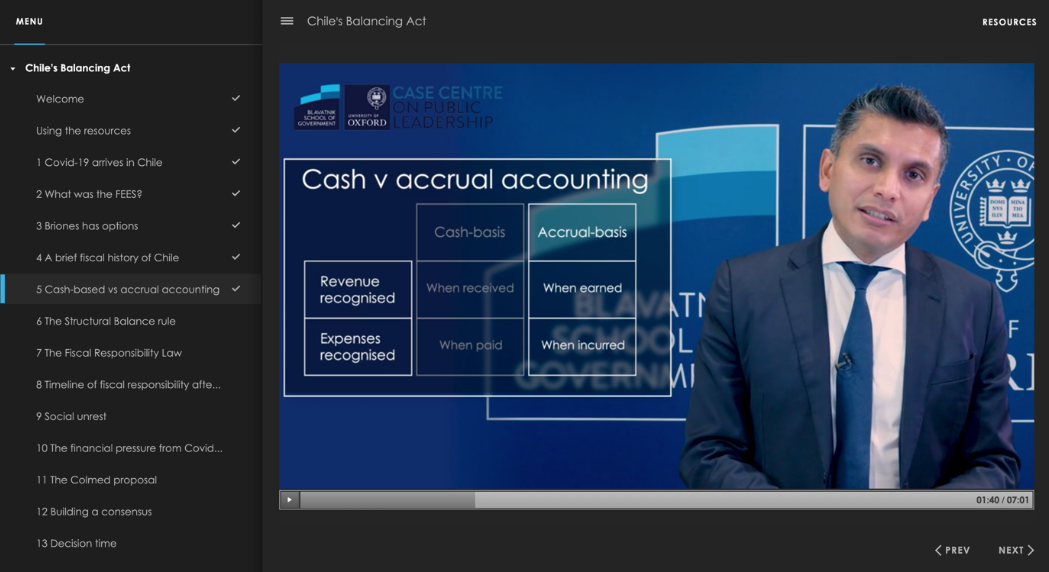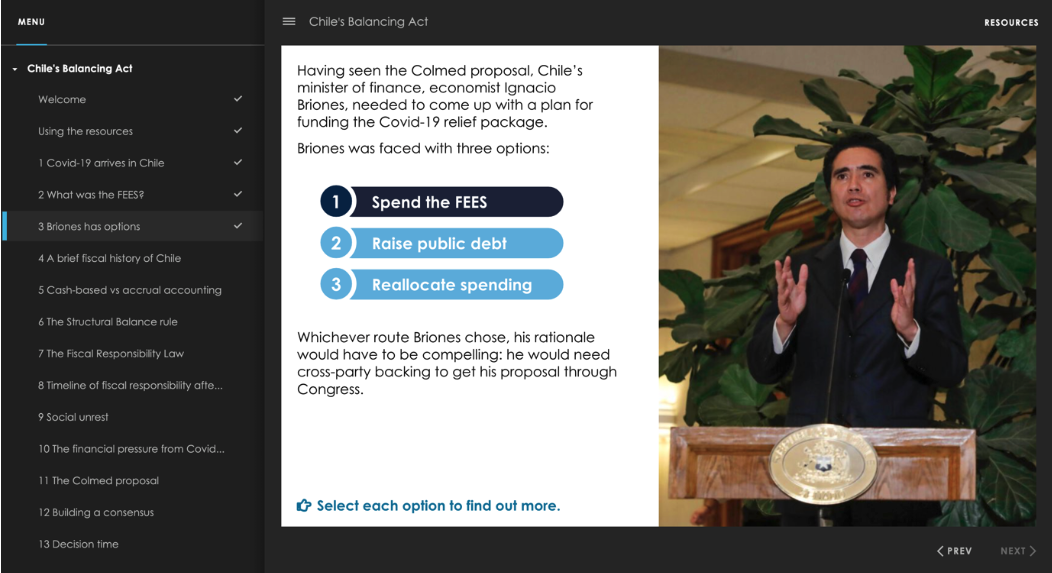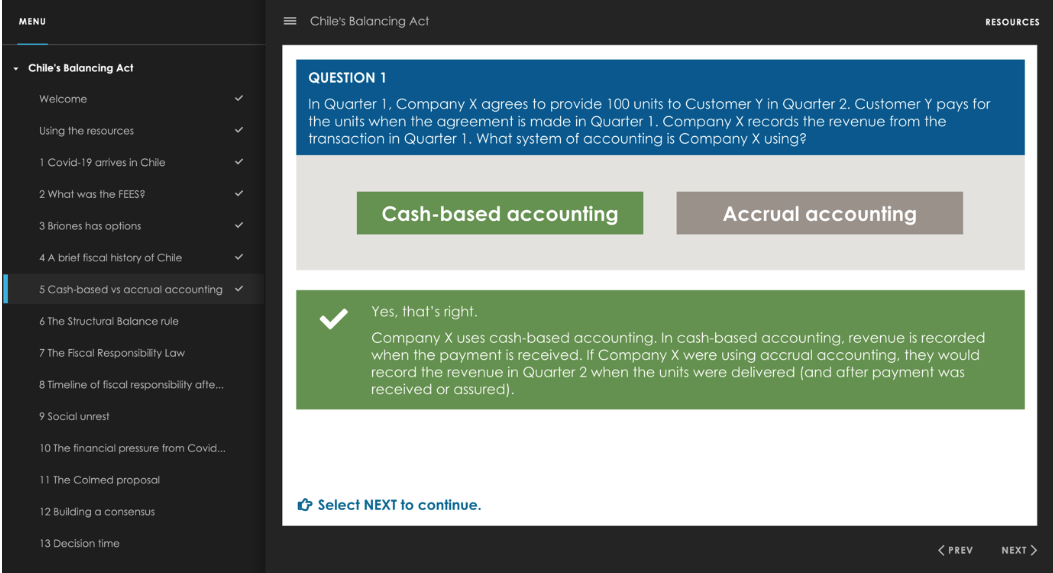Celebrating World Case Teaching Day with the first digital case study from the Case Centre
Using new technologies to bring theories to life in the public policy classroom

In May 2020, Chile’s Minister of Finance at the time, Ignacio Briones, faced a difficult decision concerning how to fund a much-needed Covid-19 relief package. Chile had built a strong reputation for fiscal discipline, secured partially through good accounting practices. But recent social unrest and the Covid-19 pandemic had created pressure on the government to relax longstanding rules on spending restraint. Briones knew that relief was necessary, yet he was concerned about undermining the country’s already weakening commitment to fiscal discipline and ensuring Chile would be able to respond to future emergencies – after all, who knew how long the pandemic would last.
In Briones’s shoes, what would you do?
With an innovative new digital case study developed by the Case Centre on Public Leadership, students have an opportunity to consider what they would do if faced with this challenge, all while learning the core accounting principles that underpin Chile’s fiscal system. The web-based case, ‘Chile’s balancing act: fiscal responsibility and emergency spending during Covid-19’, brings elements of a traditional text case together with multimedia components to provide a holistic and interactive learning experience. Students watch videos of Briones as he describes the dilemma he faced. The case narrative is interspersed with mini-lectures from co-author Professor Karthik Ramanna who explains the accounting principles, as well as with quizzes, reflective questions, and other multimedia. Intended as an interactive alternative to a traditional case, the digital case was designed to help students deepen their understanding of government accounting and fiscal responsibility through a real-life story.

Why digital cases?
Professor Karthik Ramanna, the faculty co-author, described the impetus behind the innovation: “We knew that traditional case studies work very well for education in judgement, but when it comes to technical subjects, we usually have to provide additional academic readings and lectures to accompany the case. Further, when a topic is of low salience – I know not everyone finds accounting principles terribly thrilling – students learn better in a group, through narrative rather than pure theory, and when the material is designed to be engaging.”
Professor Ramanna reflected, “For us, the digital case format presents an opportunity to bring together the technical accounting lessons with the judgement call, while the interactive features followed by the classroom discussion increases the salience and thus deepens the learning and retention.”
Developing a digital case: how did we do it?
With support from a number of e-learning specialists and the Blavatnik School’s AV team, the Case Centre team set out to turn one of our text-based cases into an interactive one. Could we find a way to combine faculty expertise – usually delivered through academic readings or lectures – with the case itself, making it a standalone teaching tool? The traditional case text explained the decision facing Briones, but for the interactive version we wanted students to get a grounding in accounting principles as well.
Guided by best practices and experienced e-learning specialists, and with superb animation created by the AV team, we produced video tutorials of Professor Ramanna teaching those elements of government accounting that were most pertinent to the case. Next, we developed quizzes to help students consolidate learnings, and prompts to encourage reflection. The new case also included video clips of an interview with Minister Briones, in which he reflected upon the decision facing him and offered advice for future policymakers managing similar challenges.
As part of the development process, we wanted to hear from potential users – the students –and so we ran a focus group with MPP students and alums. The results were positive: students found the new digital style extremely engaging, enjoyed hearing from Briones in the videos, and liked the flexibility and ownership over their own learning that they felt the web-based format leant to the case. Some students also stressed that they didn’t want to lose what they considered the benefits of the text-based case, namely that they could take notes directly on the case and easily refer to them in the classroom discussion. We incorporated their feedback, for instance by providing a downloadable copy of the case.

Teaching the case for the first time
The trial run completed, it was time to teach the case for the first time with this year’s MPP cohort. Students went through the case at their own pace, then attended a case discussion led by Professor Ramanna. The case discussion itself was organised like any typical case. The advantage of the digital case, though, was that it didn’t require additional academic readings or a lecture on accounting. Students came to the session ready to engage with the material directly. Several participants even had a go at explaining some of the more complex technical aspects of the case in layman’s terms to their peers – a skill the Blavatnik School believes to be extremely important for public leaders.
Interestingly, through the video clips of Briones, the students also seemed to have engaged more with his experiences compared to the text-based case. While quotes from the protagonist are typically included in a traditional text case, having the interactive format allowed Briones to share his political, fiscal, and emotional challenges in much greater detail, seeming to increase the ability of students to relate to his position.
Perhaps most encouraging of all, students connected with the learning material, despite having little prior knowledge of government accounting. Courtney Howard, a Canadian MPP student with a medical background, reported that she could relate to the material despite it being a new topic to her: “The benefits of accrual accounting just landed, and I found myself laughing out loud picturing the poor economist/accountant who knows it's a good idea and now has to sell it to the government.”
The interactive case study thus helped bring accounting principles to life in a way that will hopefully stick with students as they leave the School and enter the world of public leadership. As for the Case Centre team, we are keen to continue create new and innovative ways for students to engage with learning materials.
Chile’s balancing act: fiscal responsibility and emergency spending during Covid-19 is available on the Case Centre for instructors wishing to use it in their own teaching.

